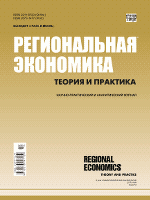Abstracting and IndexingРИНЦReferativny Zhurnal VINITI RAS Worldcat LCCN Permalink Google Scholar Online availableEastvieweLIBRARY.RU Biblioclub |
About drivers of regional development and the "white elephants" of the Russian Olympic Sochi 2014 mega-project
Available online: 15 August 2014 Subject Heading: PROBLEM. RESEARCH. SOLUTION JEL Classification: Pages: 32-39
The article underlines the idea that the Sochi 2014 mega-project has become the largest international investment and construction project, which has no analogues for decades. As the experience of the simultaneous realization of several hundred projects in one city of Russia has not taken place so far, the implementation of the Sochi Olympic project demanded the country's multibillion-dollar investment in the design and creation of infrastructure, construction, operation of sports facilities and security. Nevertheless, Russia has had time to fully prepare all objects to the Sochi Olympics. The authors underline that the influence of the Olympic Games on the economic development of their territory will show only after 3-5 years, and the long-term effects will be in 10 years and even more years only. Today it is obvious that the mission of the Olympic Sochi 2014 mega-project extended far beyond the profit from the games and the formation of a positive image of Russia in the global socio-economic space. It was also to build a global competitive edge zone of the Southern Black Sea macro-region of Russia in the fields of tourism, hospitality and leisure, recreation and sport business. The authors of the article have tried to explore the other side of the Olympic Sochi 2014 mega-project, i.e. the problem of post-project use of Olympic facilities, some of which will serve as drivers of economic growth, while others, known as "white elephants", will consistently generate losses only. The article concluded that there was not clear idea of the prospective use of Olympic facilities, located in the mountain and coastal clusters. In addition, during Olympic construction some costs were very impressive and not sufficiently substantiated. However, taking into account the uniqueness of each project, the authors are confident that the implementation of the Olympic mega-project for Russia is a valuable experience which should be thoroughly studied in order not to repeat the same mistakes when implementing already started another sporting mega-project, i.e. the Football World Cup 2018, and further minimize risks and failures when using in practice the strategic territorial management tool such as mega-projects. Keywords: mega-project, Olympiad, State Corporation, economic safety, mountain cluster, coastal cluster, investment, public-private partnership, infrastructure, post-project analysis, "white elephants", efficiency References:
|
ISSN 2311-8733 (Online)
|
|








